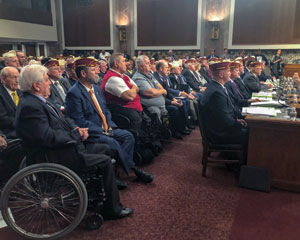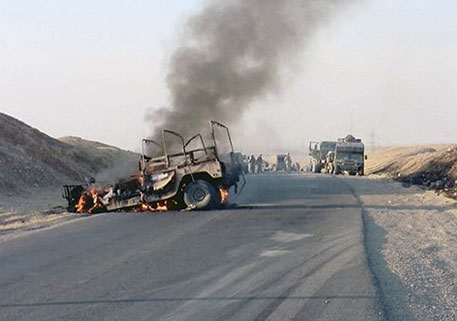
Members converge in Washington to advocate for proper implementation of VA MISSION Act, other benefits for veterans and survivors
“Keep up the good work … and go cause a ruckus this week.”
Those were the marching orders from National Commander Dennis Nixon to the crowd of veterans gathered at the 2019 Commanders and Adjutants Association business session at this year’s mid-winter conference in Arlington, Va. Throughout the annual event, held Feb. 24–27, DAV and Auxiliary members held dozens of meetings focusing on the organization’s numerous legislative priorities and advocacy efforts before taking DAV’s message to Capitol Hill and speaking directly with members of Congress and their staffs.
It has been many years since the weight and consequence of a commander’s charge has truly been so heavy, and the outcome of action or inaction so potentially pivotal to the future of health care and benefits for the nation’s veterans.
“It’s a lot of work and a lot of lobbying and sitting down talking to people,” said Kameko Thomas, an Air Force veteran and member of Chapter 23 in Seattle. “But the thing that I appreciate is that DAV has this remarkable ability to make sure that what we want to see happen for veterans actually gets done.”
Perhaps the most integral part to ensuring such outcomes occurred when Commander Nixon laid out the organization’s legislative goals and priorities for 2019 before a special joint session of the Senate and House Veterans’ Affairs Committees. During his testimony, Nixon doubled down on his charge of “causing a ruckus” by highlighting an inside-the-beltway controversy surrounding the full and proper implementation of the VA MISSION Act, which was designed to replace the Choice program, expand access and strengthen the VA health care system. He noted that since the law was signed, the VA had begun implementing it with little input from veteran stakeholders or Congress.
“Only now are we starting to see the first regulations, starting with proposed access standards,” Nixon objected before detailing DAV’s concerns. “Will the private sector be ready to handle a large influx of new veteran patients? Will the VA be ready to seamlessly coordinate the care of veterans using both VA and private providers? And will the VA have enough funding to meet the new obligations of the MISSION Act, while continuing to fully fund VA hospitals and clinics?
“Let me make one point crystal clear: We will not stand for cutting services or closing hospitals that disabled veterans depend on,” he stated to applause from those in attendance.
Nixon went on to call on Congress and the VA to further expand the VA Caregiver Support Program to also include veterans whose serious disabilities were caused by service-connected illnesses. He also called on both committees to pass legislation strengthening women veterans health care and benefits, including the Deborah Sampson Act.
Additionally, he voiced DAV’s support for securing benefits for Blue Water Navy veterans who were exposed to Agent Orange while serving off the shores of Vietnam. He also urged Congress to ensure the VA continues research into diseases that may be caused by burn pit exposure and to enact legislation that would concede that veterans of all eras who were deployed to locations with active burn pits were indeed exposed to dangerous toxins.
Nixon also reminded the joint committee of the second inaugural address of Abraham Lincoln, who spoke of those who had “borne the battle.” Nixon noted that Lincoln also included the widows and orphans who “laid so costly a sacrifice upon the altar of freedom.” The commander again called on Congress to pass legislation that will ease the financial hardship and improve and enhance education and Dependency and Indemnity Compensation benefits for caregivers, surviving spouses and family members of totally disabled veterans.
Nixon closed his testimony by quoting fellow Texan and former Dallas Cowboys quarterback Roger Staubach, a Navy veteran who served in Vietnam: “All of us get knocked down, but it’s resiliency that really matters. All of us do well when things are going well, but the thing that distinguishes us is the ability to do well in times of great stress, urgency and pressure.”
DAV members were pleased with the scope of the testimony.
“I was impressed not only with the amount of [DAV] representatives that were there but with the committee members who were,” said Denice Williams, a member of Chapter 22 in Portsmouth, Va. “And more than once I heard that their priorities are our priorities, so that means they understand we have issues that need to be resolved and need to be researched more deeply.”
“It was nice to see a bipartisan Senate and House of Representatives unity and cohesion in addressing veterans’ matters,” said Jim Scruggs, also member of Chapter 22.
“It’s a lot of information to take in,” Thomas added, “but it always results in something that benefits our veteran brothers and sisters.”
Learn more
Reports and videos are available online at dav.org/events/2019-mid-winter-conference.






